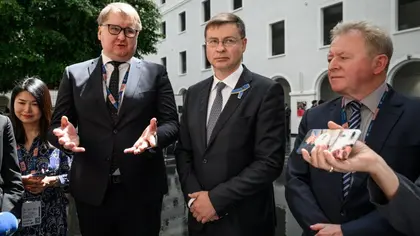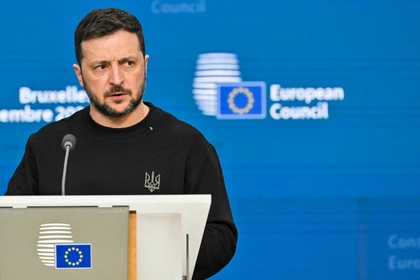The European Parliament’s trade committee gave the green light on Tuesday (9 April) to a last-minute deal to extend trade liberalisation with Ukraine until 2025, which Kyiv’s trade minister said is key to sustaining the Ukrainian economy.
With 26 votes in favour, eight against and no abstentions, the international trade committee (INTA) approved the provisional agreement reached in interinstitutional negotiations on Monday, prolonging Ukraine’s trade benefits until June 2025.
JOIN US ON TELEGRAM
Follow our coverage of the war on the @Kyivpost_official.
The so-called Autonomous Trade Measures (ATMs), first introduced in 2022 after the Russian invasion and due to expire in June, aim to facilitate Ukrainian agricultural exports to the EU by removing all remaining tariffs and trade barriers.
“The ability to scale production with exports [to the EU] is a key driver for the Ukrainian economy,” Kyiv’s Trade Minister Taras Kachka told Euractiv ahead of the vote.
The compromise approved by the committee includes enhanced safeguards against market distortions, including an emergency brake if imports of “sensitive” products – poultry, eggs, sugar, oats, maize, cereals and honey – rise above the average import levels in the second half of 2021, and all 2022 and 2023.
While Kachka said that “any form” of trade liberalisation was a relief for Ukraine, he regretted the additional limitations.

EU Leaders Call For Increasing Electricity Exports to Ukraine
According to him, the new compromise would result in a reduction of €350 million in revenues for Ukraine, with the annual value of ATMs for Kyiv at €2.15 billion.
For the provisional agreement on ATMs to be formalised, the plenary will still have to give the final go-ahead at a session on 22-25 April, the last of the current mandate. The EU Council must then also give the green light.
Enhanced safeguards
The surge of Ukrainian food imports into the EU resulting from trade benefits has raised concerns among farmers – particularly in Eastern Europe – about cheaper products flooding the EU market and pushing down grain prices.
A blocking minority led by Poland and France succeeded in including the second half of 2021 – before the Russian invasion, when EU imports from Ukraine were significantly lower – in the reference period for triggering safeguard measures.
The coalition also tried but failed to include wheat and barley in the list of sensitive products, as demanded by the Parliament in mid-March.
For Kachka, safeguard measures have become “extremely political”.
“[For] products treated as sensitive, the situation on the ground is different from what was discussed within the political debate,” he said.
EU co-legislators also agreed on Monday to start discussing a permanent tariff liberalisation with Ukraine in the coming weeks.
Asked about Ukraine’s expectations, Kachka said the EU should move towards a more “sober and substantive” debate on trade restrictions, and pointed to polarisation in the political debate.
Not enough
Meanwhile, the deal on ATMs fell short of the expectations of EU farmers association COPA and COGECA, which described the exclusion of wheat and barley as unsustainable for the sector.
“We are disappointed, we expected more,” COPA president Christiane Lambert told Euractiv, adding that the inclusion of half of the year 2021 was only half a step forward.
In a similar vein, speaking after the informal meeting of agriculture ministers in Genk on Tuesday, French Agriculture Minister Marc Fesneau said the compromise was insufficient and called on the Commission to step up efforts to regulate the cereals market.
“We can’t wait for the [cereals] market to become even more destabilised before intervening again,” he added.
You can also highlight the text and press Ctrl + Enter






